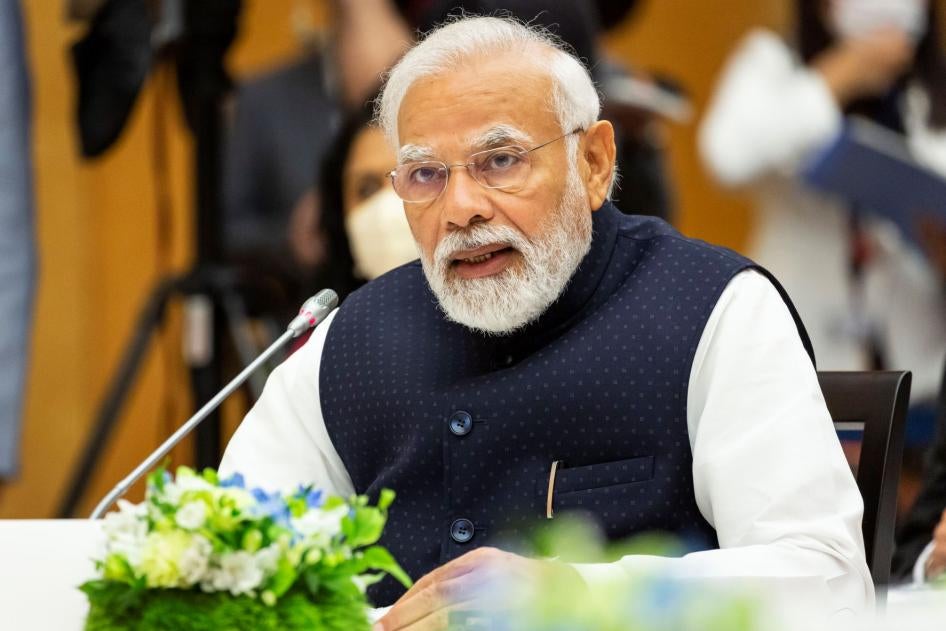When India’s Prime Minister Narendra Modi visits Sydney this week, there should be no empty clichés from Australia’s leaders simply hailing India as “the world’s largest democracy.” With that title comes responsibilities to live up to democratic values.
Instead, Prime Minister Anthony Albanese should focus on the facts. Scores of rights activists are in jail across India at present while others are battling politically motivated investigations. Modi’s Bharatiya Janata Party (BJP)-led government has been tightening its grip on civil society, using draconian laws to arrest and intimidate activists, journalists, opposition leaders, academics, peaceful protesters, and critics of government policies. This is shrinking the space for free speech, with independent journalists forced to self-censor.
Through its abusive foreign funding law, Modi’s government has shut down funding for thousands of nongovernmental groups, particularly those that work on human rights or the rights of vulnerable communities.
The government even tried to justify tax raids on the BBC in February, in apparent reprisal for its critical two-part documentary about Modi. The government had used emergency powers to block the documentary in India using emergency powers. Meanwhile pro-government media use inflammatory language against minority communities with little objection from the ruling party leadership.
The Indian authorities are also using technology to curtail rights during its crackdown, imposing the largest number of internet shutdowns of any country globally. In an increasingly digitised world, these shutdowns have resulted in millions of Indians who benefit from government programs losing access to essential goods and services. New laws and policies effectively allow greater governmental control over online content including to curb legitimate criticism, weaken encryption, and seriously undermine rights to privacy, freedom of expression, and information online.
The BJP government has also repeatedly adopted laws and policies that systematically discriminate against minority Muslims and Christians. Together with the frequent divisive speeches by BJP leaders and ideologically Hindu-majoritarian affiliate groups, the BJP government has effectively normalised violence and encouraged threats, harassment, and attacks on minority religious communities.
In March, India’s most prominent opposition leader Rahul Gandhi was sentenced to two years in prison in a politically motivated criminal defamation case after he raised questions about the Prime Minister’s close relationship with a billionaire industrialist accused of corporate fraud. Leaders of other political parties, as well as government critics, have also been arrested or are facing politically motivated federal investigations.
So far, India’s human rights issues have not been at the top of Albanese’s agenda. When he visited India in March, he rode a chariot around a cricket stadium with Modi in Modi’s home state of Gujarat. Back then, Albanese deflected direct questions from journalists about rights concerns in India, saying: “I look forward to having positive discussions with the Prime Minister. One of the things that my government has done also is to return to acting like a diplomatic government should. We’ll continue to act in that vein to develop positive relationships. We always stand up for our values.”
Following meetings in New Delhi in March, Foreign Minister Penny Wong responded to journalist questions about rising attacks on media freedom and violence against minorities in India, claiming such matters were raised privately saying, “You would anticipate in our engagement with all countries that those values form part of how we engage.”
There should be no avoidance in Sydney.
Albanese, Wong, and other ministers should be unequivocal in raising human rights with Modi, pointing out that his government’s actions belie its international claims of upholding democratic principles.
The Australian government should not repeat the same mistakes it made with the Chinese government by pursuing deeper trade engagement while sidelining human rights concerns. All that has done is bolstered the Chinese government’s ability to suppress the rights of its citizens, inside and outside the country.
If Australia’s prime minister and foreign minister are uncomfortable raising specific human rights concerns because they want closer trade and security ties with the Indian government, they should think of all the people in India who aren’t able to speak up because they fear being arrested or prosecuted. Using “quiet diplomacy” has had no evident impact on the human rights situation and has led to growing sentiment that Australia is willing to overlook the plight of affected communities in India to win over India as an ally against China and Russia.


